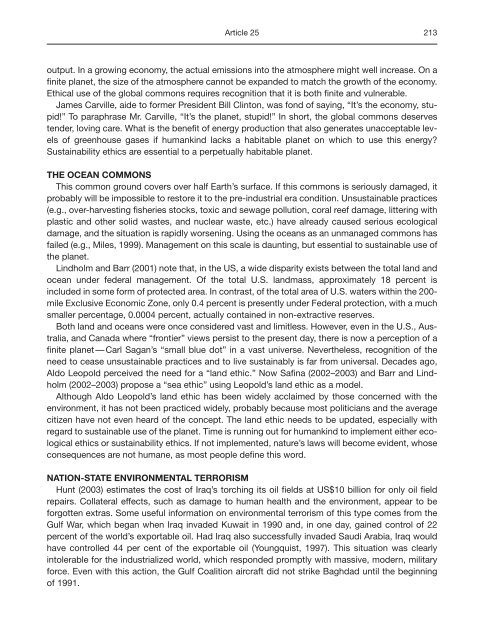View - ResearchGate
View - ResearchGate
View - ResearchGate
You also want an ePaper? Increase the reach of your titles
YUMPU automatically turns print PDFs into web optimized ePapers that Google loves.
Article 25213output. In a growing economy, the actual emissions into the atmosphere might well increase. On afinite planet, the size of the atmosphere cannot be expanded to match the growth of the economy.Ethical use of the global commons requires recognition that it is both finite and vulnerable.James Carville, aide to former President Bill Clinton, was fond of saying, “It’s the economy, stupid!”To paraphrase Mr. Carville, “It’s the planet, stupid!” In short, the global commons deservestender, loving care. What is the benefit of energy production that also generates unacceptable levelsof greenhouse gases if humankind lacks a habitable planet on which to use this energy?Sustainability ethics are essential to a perpetually habitable planet.THE OCEAN COMMONSThis common ground covers over half Earth’s surface. If this commons is seriously damaged, itprobably will be impossible to restore it to the pre-industrial era condition. Unsustainable practices(e.g., over-harvesting fisheries stocks, toxic and sewage pollution, coral reef damage, littering withplastic and other solid wastes, and nuclear waste, etc.) have already caused serious ecologicaldamage, and the situation is rapidly worsening. Using the oceans as an unmanaged commons hasfailed (e.g., Miles, 1999). Management on this scale is daunting, but essential to sustainable use ofthe planet.Lindholm and Barr (2001) note that, in the US, a wide disparity exists between the total land andocean under federal management. Of the total U.S. landmass, approximately 18 percent isincluded in some form of protected area. In contrast, of the total area of U.S. waters within the 200-mile Exclusive Economic Zone, only 0.4 percent is presently under Federal protection, with a muchsmaller percentage, 0.0004 percent, actually contained in non-extractive reserves.Both land and oceans were once considered vast and limitless. However, even in the U.S., Australia,and Canada where “frontier” views persist to the present day, there is now a perception of afinite planet — Carl Sagan’s “small blue dot” in a vast universe. Nevertheless, recognition of theneed to cease unsustainable practices and to live sustainably is far from universal. Decades ago,Aldo Leopold perceived the need for a “land ethic.” Now Safina (2002–2003) and Barr and Lindholm(2002–2003) propose a “sea ethic” using Leopold’s land ethic as a model.Although Aldo Leopold’s land ethic has been widely acclaimed by those concerned with theenvironment, it has not been practiced widely, probably because most politicians and the averagecitizen have not even heard of the concept. The land ethic needs to be updated, especially withregard to sustainable use of the planet. Time is running out for humankind to implement either ecologicalethics or sustainability ethics. If not implemented, nature’s laws will become evident, whoseconsequences are not humane, as most people define this word.NATION-STATE ENVIRONMENTAL TERRORISMHunt (2003) estimates the cost of Iraq’s torching its oil fields at US$10 billion for only oil fieldrepairs. Collateral effects, such as damage to human health and the environment, appear to beforgotten extras. Some useful information on environmental terrorism of this type comes from theGulf War, which began when Iraq invaded Kuwait in 1990 and, in one day, gained control of 22percent of the world’s exportable oil. Had Iraq also successfully invaded Saudi Arabia, Iraq wouldhave controlled 44 per cent of the exportable oil (Youngquist, 1997). This situation was clearlyintolerable for the industrialized world, which responded promptly with massive, modern, militaryforce. Even with this action, the Gulf Coalition aircraft did not strike Baghdad until the beginningof 1991.















